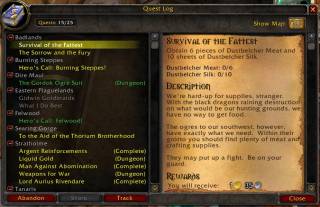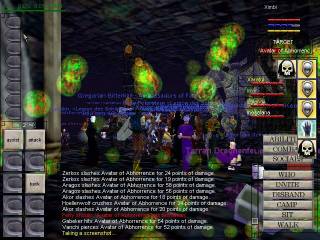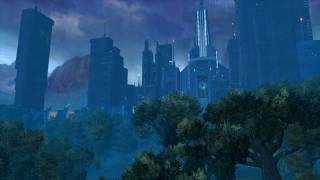Repetitive Gameplay and MMORPGs
By gamer_152 13 Comments
Despite the sheer popularity of MMORPGs, there seems to be a certain degree of backlash against the kind of repetitive and often passive gameplay that they employ. It’s not uncommon to hear people talk about quests that require players to kill X number of enemies or collect X number of things as bad game design, and the act of killing large numbers of enemies in very similar fashions is often shunned as “Grinding”. I also get the sense that some games enthusiasts believe the future of the MMORPG rests in working out how to cut this kind of repetitive action out of the games, and just leave the satisfying progression mechanics. However, I think there are sometimes misconceptions surrounding conventional MMORPG gameplay and what it means to change it, and I believe that there’s something genuinely good about the manner of “grindy” gameplay that these games are often going for.
The Problem

Just to clarify, I’ll be using the term grinding a fair bit here, but I’m not referring to those situations where a game runs out of new quests, new locations, new enemies, and other kinds of content, and you’re consequently stuck killing the same kind of enemy in the same location for the next five hours with little greater goal. I’m talking about the core of MMORPG gameplay, where you’re going out into the field and engaging in a long succession of similar battles that are far more dependent on your character stats than any particular effort or ability on your part. You can argue that’s not really “grinding”, but for the purposes of this blog I’m going to need a single term to reference that kind of gameplay, and “grind” seems to fit better than anything else.
The basic reason why the grind has gotten so much flack is obvious; asking players to repeat the same few actions with little challenge to slowly progress through a game doesn’t have the moment-to-moment thrill of running, jumping, and fighting your way through most action games, or the intellectual empowerment of carefully devising and executing a plan that most strategy games have. A lot of people seem to think the problem itself is in the aforementioned “X number of Y” quests that these games often implement, but while these quests are representative of and contain gameplay that a lot of players don’t like, I don’t think they’re a problem within themselves. They’re really just a way of splitting up and framing the gameplay that already exists, and better distributing rewards within the game. Quests in RPGs are just a type of wrapper for other content; even if they didn’t exist you’d still be running around the world killing a lot of the same thing over and over. Again, the root problem is that most find that the core gameplay isn’t actively engaging.
Sometimes I become bored with MMORPGs too. If you talk to me in any given moment I’m probably going to opt to play something like Civ or Halo over an MMO, and if the style of gameplay that MMOs are offering just isn’t what you’re interested in, more power to you. My problems are really to do with the implied ideas that getting players to grind in MMORPGs is just bad design that needs to be eliminated, and people not recognising the positive things that this kind of gameplay has brought us.
The Positives

Grinding is something that’s a part of MMORPGs and RPGs in general for a few reasons. For starters, it provides us a sense of productivity and progression that isn’t as present in the in-your-face mechanics of other games, but is part of a more laid-back and reserved gameplay experience. While I love the active kind of engagement that the majority of games offer, and believe a lot of people would benefit from not treating entertainment as something to just turn off their brains in front of, sometimes you want to sit down, relax, and feel the steady but reliable sense of advancement that comes with repeating slight variations on the same task over and over. There are plenty of hobbies in the world that just require a bit of patience and slowing down to get some enjoyment out of them, and we have so many games out there that are about keeping the player constantly highly stimulated, so I think there’s plenty of room for a more subdued flavour of gameplay in games. This kind of relaxed experience can also juxtapose another fairly passive activity. It’s pretty common for people to play MMOs while also consuming podcasts, music, videos, and movies, or talking with friends.
In addition, the focus on progression mechanics and loot, instead of skill-based gameplay, allows for players to receive greater rewards for dedication to the game, and makes items and their acquisition feel more important. It can also create a more level playing field in a way that a lot of other games can’t. In the large majority of games, the players who are most rewarded are going to be those who have better reflexes, greater special awareness, are better at making tactical decisions, etc. and almost all MMORPGs include some gameplay rooted in at least basic action and strategy, but they generally don’t hold withhold a reward from you because of a lack of skill, and aim to make you feel like it’s your productivity in the world that is more important than anything else.
It’s common for many MMOs to become more strategy-oriented in the upper levels, but essentially any two players can be the same level as long as they’re dedicated enough to the game. Even when one player outclasses another by having better items, all players have the exact same chances that any one item will drop for them, and any player can hypothetically collect any amount of gold to buy new items, if they play for long enough. It’s this commitment that you really feel like you’re being rewarded for a lot of the time, and this level playing field cannot only provide something beneficial for long-time players of video games, but can also create a much more welcoming experience for the casual gamer. That’s one of the reasons we’ve seen so many popular Facebook games employing RPG mechanics. Maybe the gameplay experiences I’ve described here aren’t your thing, but I think we can all at least see how there’s some worth in them.
Eliminating the Grind

Interestingly, even in games that are largely based around it, there are motives for the designers to start filing away at parts of their regular repetitive MMO combat, just not always for the right reasons, or with the best results. Maybe the example I’m about to give is a little specific, but it seems important that we all realise this kind of thing can happen. At a point World of Warcraft ran into an issue. Blizzard wanted to bring out new expansions and add new levels and content onto the end of the game, but with new content only being available to the highest level characters, they were essentially placing a barrier between many players and the expansion content they wanted them to consume. This was especially true when it came to players making new characters, or players who were new to the game entirely, a group that Blizzard naturally value a lot. It seemed to be with this in mind that the developers made a number of changes to the game that made it much easier for players to quickly rush their way up from level 1 up to the expansion content.
In places it may have been that Blizzard were genuinely tweaking level requirements they’d set too high, but when people talk about being able to dash through the majority of the game’s levels in under 24 hours without particularly trying, that’s something else entirely. One of my favourite parts, maybe my favourite part of World of Warcraft and games like it, is the world itself, and to see games where they want to speed me through the beautiful world they’ve created just to get me to the high level zones is disheartening. Blizzard’s problem is only likely to worsen for them as they continue to bring out more expansions, and the level requirements for the content they want everyone to be playing get higher. Games that end up in a similar position to WoW run the risk of doing the same.
Now, if we want to remove the grindy bit from MMOs properly, the obvious solution is to replace the bit where you’re interacting with enemies by just clicking on them and periodically hitting the number keys with the more actively engaging kinds of systems that we’ve already seen in other types of games. The thing is, while this looks great on paper, the reality of developing these sorts of games can be pretty difficult. Let’s be clear, game development is already really hard as it is, and developing an MMO specifically, with their enormous quantity of locations, weapons, enemies, quests, etc., all of which have to work properly in conjunction with each other, is a bit of a nightmare. With these genre hybrid MMOs however, it has the potential to be even worse. To keep this simple, I’m going to use an MMOFPS as an example, but hopefully you should be able to see how these problems would extend out to other less conventional kinds of MMOs.
With our MMOFPS you’ve already put more on your plate just by the fact that you’re now trying to simultaneously get the MMO side of the game properly made, and ensure that the FPS gameplay is also enjoyable. The addition of gunplay also means that designing and balancing weapons is no longer just a game of drawing up regular RPG stats for weaponry, but that weapons are now complicated by having recoil, clip sizes, firing speeds, firing types, and other new variables. There are huge differences between a sniper rifle and an assault rifle in an MMOFPS that you just won’t find between two weapons in another kind of MMORPG, so imagine trying to account for hundreds or even thousands of different kinds of shotguns, assault rifles, and other guns in your game. At a more fundamental level, slamming two different games together, or splicing one set of game mechanics into another, is often much different in practise than most people perceive it.
Combining Games
It’s common to hear people say they’d like to see X game combined with Y or that this hot new game is X combined with Y, and yeah, to some extent you can combine games or mechanics like that, and that can be a perfectly useful way to describe games, but the idea that you can just smash any two games together and get the best of both is a myth. When you’re creating a meal you can’t just combine any foods you really like, you have to find flavours that complement each other, and avoid those that clash. On top of this, whatever you create out of all those ingredients is going to be very different to eat than if you were eating those ingredients on their own, or as part of another meal. The same thing essentially applies for game design, and really for design and working creatively in general. Successfully combining two games or types of games isn’t done by simply creating a game with all the mechanics from game X and game Y, it’s about finding the places where the elements of both complement each other and using them together in a way that works, and avoiding or coming up with creative fixes for where the game elements clash. Sometimes the same mechanics can even compliment in one way, but conflict in another.
RPG mechanics often suit the mechanics of other games well because the “RPG” genre label describes a set of wrappers for core activities in a game, as opposed to the core activities themselves. I.e. while a hack-and-slash game is defined by its central system of melee combat, or a turn-based strategy game is classified as such because of the way you’re producing and controlling units against an opponent, the “RPG” title doesn’t care about those core interactions; it just means a game with experience, levelling, character stats, gear, etc. So in our MMOFPS, we can easily see how we could make the FPS and MMORPG mechanics compliment by giving a player experience points when they kill an enemy, or have them acquire their new guns from an NPC instead of just unlocking them from a menu. However, things get more complicated when we look at the situations where the mechanics don’t line up exactly. For example, when you’re creating an MMOFPS it’s impossible to simultaneously have character stats be the primary deciding factor in combat, as it is in most MMORPGs, and have peoples’ skill with moving and shooting be the primary deciding factor in combat, as is the goal of other FPS games. Of course you can find a middle ground between the two where combat is reliant on a combination of skill and RPGish dedication, and create a new kind of game out of that, but this is kind of my point.

The game you create by putting two different games or kinds of games together isn’t just all the bits of game/genre A and all the bits of game/genre B, or all the best bits of game/genre A and all the best bits of game/genre B, it’s a new experience that is going to feel different from both of those original games/genres, and it will be one where elements of the original games or genres have to be cut out or altered to make sure that they fit together into this new template. You are not going to get a game that feels simultaneously like World of Warcraft and whatever other game you want to plug into that second slot. The MMOs that exist now which break from the WoW formula are proof of that.
Some elements also conflict in a considerably harsher way than the skill-based combat vs. progression-based combat situation I mentioned above. Thinking about how an MMORTS would work is a good way to see where more stark contrasts can occur. For example, look at how MMORPGs try to present an open world that all players are free to run around in, whereas most RTSs are about players claiming areas of the map entirely for themselves and plonking down buildings wherever they like.
All in all, I understand why there are people who want MMORPGs that subvert the traditional genre conventions. Hell, that’s something I really want as well, and I think there’s a lot of interesting and fun things to be done with MMOs that put something new in place of regular RPG combat, but we have to be clear on what exactly we’re removing from the game when we ask for that. It’s that sense of laid-back blissful productivity and a great focus on dedication that get lost. We can create new kinds of MMOs that provide things that “grindy” MMOs traditionally haven’t, but I don’t see these games as obsoleting WoW or simply improving on WoW as much as I see them providing an alternative, even if that alternative is one that’s more actively engaging, or even appealing to more people.
Cold Hard Cash

The complications here go beyond just the design though; we know there are significant difficulties in getting new kinds of MMOs made and running from a financial perspective. Games cost a lot of money to create to begin with, but MMOs in particular require a huge deal of time, resources, and cash to build, and development costs for games are constantly rising. Investors are of course reluctant to put large amounts of money into anything that’s risky, and not only have some of the industry giants run into great trouble trying to create MMOs that play things relatively safe, but the MMOs that are going to try and break away from the traditional formula, and come up with new ways to do things, are by their nature particularly risky. There seem to have been more games in recent years that have aimed to break out of the standard mold for MMOs, with varying results, but it’s still hard to see this as anything but shaky ground. It must also be remembered that with almost all MMOs either relying on a microtransaction model, or a subscription fee, they need to not just have someone invest in them in the first place, but have to keep making money for their entire lifespan if they’re to stay in business. We can all think of MMORPGs that enthusiastically burst onto the scene, and then gradually withered and died as people lost interest in them and competition put pressure on them.
As impossible as it may seem to develop in the MMORPG space, there are a number of MMOs out there that have managed to remain afloat for a long time, even with significant flaws, largely because they’ve kept to a modest budget. From more traditional MMOs like Tibia or Runescape, to more experimental ones like Maplestory or Puzzle Pirates, we can see games that through careful design and low-end graphical technologies have managed to get along fine, even when many higher status MMOs have gone under. Granted, these games don’t rake in the profits of the successful higher-end MMOs, and many of the companies out there who are candidates for creating MMOs aren’t going to bother unless they know they can make AAA MMO money, but these kinds of games are at least making a profit. This isn’t to say that people shouldn’t be trying to create bigger budget MMOs, experimental or not, but we can see that there’s at least a kind of B-tier MMO that can exist which may be more practical for many of those developers looking to break away from the traditional MMO formula.
So to recap, I think repetitive MMO gameplay can be a good thing, bad things can happen if developers remove it within certain contexts, eliminating the grind isn’t always that simple, you can’t just slam two games or two sets of mechanics together, and big budgets are once again the Devil. Thanks for reading.
13 Comments